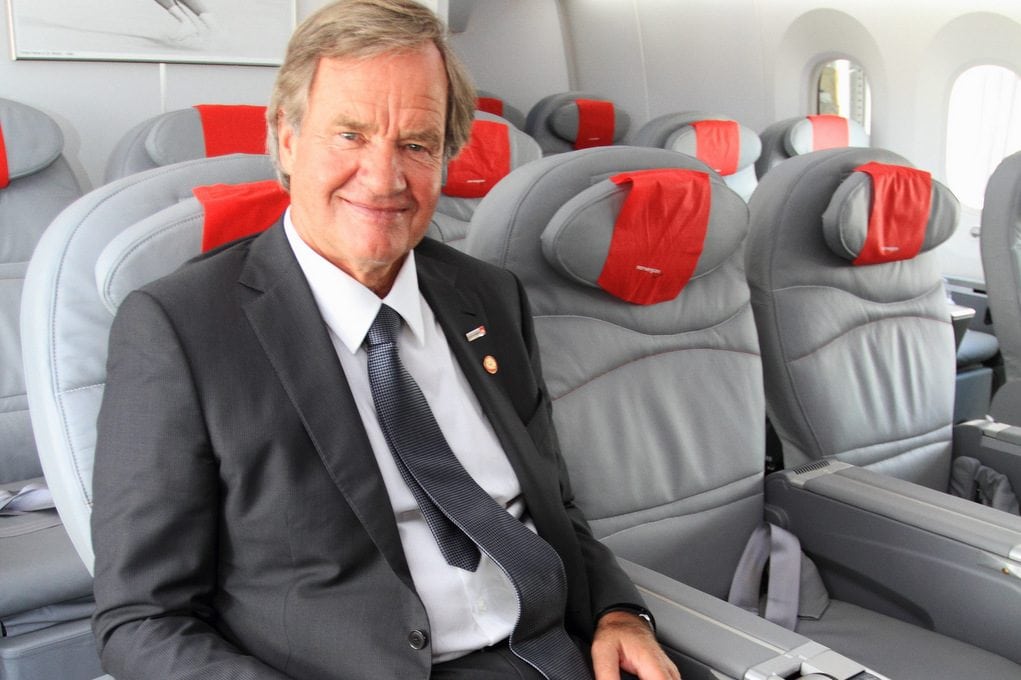Norwegian Air CEO Is Wait and See on Possible Sale as Competitors Show Interest

Skift Take
Norwegian Air CEO Bjorn Kjos said Thursday he would prefer not to sell the company he built from nothing into a low-cost global behemoth, but said he will let investors decide its future. His remarks came after Norwegian announced a second quarter profit that surprised analysts, many of whom had soured on Europe’s third-largest discounter.
“Everybody that works for an airline would rather stay independent,” he said in an exclusive interview with Skift at Norwegian’s headquarters outside Oslo. “But we are on the stock exchange. We have to accept that everyone who buys shares on the stock exchange will be an owner of Norwegian.”
The question of whether Norwegian will sell, and to whom, is a hot topic among European airline insiders. The heads of some larger players, including International Airlines Group, or IAG, owner of British Airways and Iberia, and Lufthansa Group, long have said Europe needs U.S.-style consolidation.
They’ve said weaker airlines may be ripe for acquisition, and while passengers tend to like Norwegian for its low unbundled fares and transatlantic route network, it has been under financial pressure, with analysts asking if it expanded too quickly. Before it began rapidly adding transatlantic flights about four years ago, Norwegian was a solidly profitable regional operator respected by investors.
But as the airline’s stock price has fallen as its costs have increased, established carriers have expressed interest. Lufthansa Group and IAG have said they might want Norwegian, and in April, IAG bought 4.61 percent of Norwegian's stock, later confirming it had made offers for the entire company. Lufthansa or IAG could use the acquisition to put a pesky competitor out of business and grow their own low-cost businesses.
Kjos has also said he had fielded inquiries from other, unnamed airlines. Asked Thursday if the suitors had shown increased interest recently, Kjos played it coy. “Not as far as I have heard,” he said. But while he is believed to want to retain control — he owns about a quarter of Norwegian — he said he’s not surprised others covet his airline.
Norwegian may not be Europe’s most profitable or punctual carrier, but it has had success poaching legacy airline customers. It is also responsible, in part, for changing how established carriers price transatlantic routes, with more legacy airlines offering no-frills fares to compete.
“It would be bad if nobody would have been interested,” Kjos said. “It says that we are doing something right.”
Surprisingly Strong Quarter
It is not clear how Thursday’s positive quarterly result might affect dynamics of a possible sale, though in the short-term at least, the company is worth more than last week. Its stock rose as much as 8 percent on Thursday.
Norwegian reported net profit of 300 million Norwegian Kroner, about $37 million U.S, as the airline reduced its unit costs by 19 percent, not including fuel. Analysts polled by Bloomberg had expected the company to lose 468 million Kroner, or $57.6 million.
They had good reason to expect the worst. Last year, during the same period, Norwegian lost 691 million Kroner, or roughly $85 million, even as many competitors took advantage of lower fuel prices to post near record profits. In 2017, analysts feared Norwegian let its cost grow too quickly, as it did whatever it could to build scale, including in the United States, now its strongest overall revenue producer outside of Norway.
Norwegian is still growing remarkably fast, adding capacity by 48 percent in the quarter, while many full-service competitors grow in the low-to-mid single digits.
It is expected to add less capacity going forward, and its major U.S. expansion is nearly over, Kjos said. "Our strategy is to have a much flatter growth," he said.
Not All Good News
There are, however, some indications Norwegian’s second quarter was not as favorable as it appeared. The airline’s yield, a rough measure of ticket prices, fell 10 percent year-over-year, while unit revenue decreased 11 percent.
Kjos said he blamed the poor revenue performance on the capacity increases.
“When you set so much production capacity into the market, it will take time before the routes are set in the market, before people actually see what you are doing, and get used to it and try it,” he said. “Sometimes it will take some months. On some routes it may take a year or two. The longer you are in the market, the better set you are.”
In addition, costs may be continue to be an issue despite Thursday's headline, said Daniel Roeska, an analyst with AllianceBernstein. He noted that the airline said its maintenance expenses for the quarter were flat, year-over-year, despite Norwegian’s growth. That’s probably not sustainable, he said.
“Flat maintenance expenses were a key driver of reduced unit cost across the quarter,” he said. “There may be a chance that this is a timing issue, and the company may see a greater level of maintenance spending later in the year."
Roeska, who recently estimated that each Norwegian long-haul flight may lose between 20 and 25,000 euros ($23.3 million- $29.1 million U.S.) said the airline also took advantage of an unusually high number of one-time benefits in its second quarter results. "I'd argue [there's] underlying a little improvement, but not as positive as the markets are taking it," he said in an email.
Overall, though, Kjos struck back against analysts, many of whom have a sell rating on the stock. He said they don't grasp the model.
“It strikes me that a lot of them haven’t actually been able to understand what’s happening," Kjos said. "They are thinking like an old legacy carrier, some of them. We heard the same from a lot of analysts 10 or 15 years ago that Ryanair and EasyJet were a flop and would never survive."
Views on European Consolidation
While some of his competitors speak of consolidation as a panacea, Kjos said he not convinced Europe needs more airline mergers.
“To consolidate an airline is not that easy," he said. We bought an airline 10 years ago and we used a lot of management capacity to take it into our operation. It’s not an easy thing to do.”
But he acknowledged another round of mergers is probably likely, whether or not Norwegian is involved, because there are still some weak players. And that means prices should rise, he said.
“Of course, consolidation is not good for passengers because it will increase fares, that’s for sure,” he said. “The airline industry is just another commodity industry, and if you don’t have scale you probably will have difficulties unless you are in a niche area. That’s why it might be tough for the smaller players to compete."
Ryanair CEO Michael O’Leary recently has said some European airlines may not survive current fuel spike, and at one point last year he lumped Norwegian into a group of weakened airlines, saying Norwegian might last only another four or five months.
But Kjos said he has gotten adept at ignoring his rival.
"Whatever way he can get journalists' attention, he will say it," he said.




